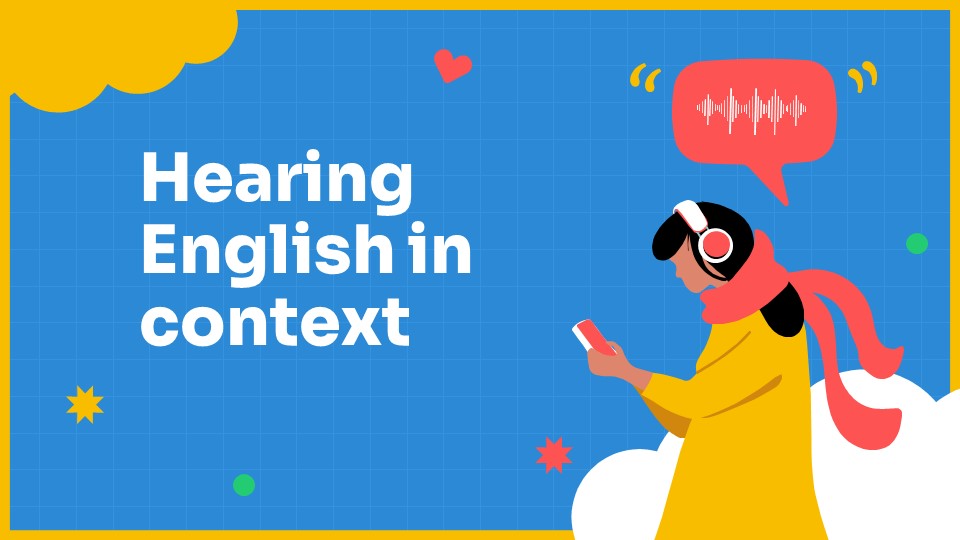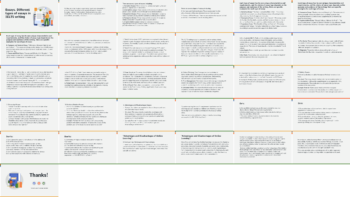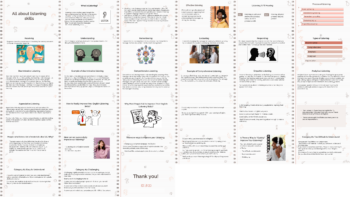HEARING ENGLISH IN CONTEXT
5000 so'm

Slayd 1
Hearing English in context
Slayd 2
PLAN
Listening and hearing differences
Listening and hearing problems
Some feature of listening and hearing
Solutions for listening and hearing problems
Slayd 3
Listening and hearing are two different skills. People may listen but not hear and they may hear but not really listen. This refers not only to EL lessons but to life in general
Slayd 4
Listening and hearing are two different skills. The former is what we acquire while learning a language; the latter depends on the inborn abilities. Some people hear better than others; lots of humans have the capacity to hear at 98%. Compared to 100% a 2% difference may not seem too big, but it is definitely not negligible. In terms of studying a new language and identifying new sounds, this may mean that while our students can hear perfectly well, they may lose the thread or even not understand a dialogue or monologue.
Slayd 5
In other words, they listen, hear and repeat individual words and sentences well but get lost when they are confronted with a continuous lengthier utterance. Teachers are not medics; we cannot diagnose our students’ physical ability to hear. We can help them cope with any problems using several techniques.
Slayd 6
Teenagers and adults enjoy those videos. Music, video clips, human interest stories, amazing animals are very good aids. If the existing commentary is too complicated.
Slayd 7
Using any kind of recording including our own ones during a lesson helps us to save our own energy. We can run it many times as needed, change volume, pause. It is important to remember that the younger our students are the better they can hear; it does not mean that they necessarily understand everything
Slayd 8
Listening skill is one of the most important skills that learners need to master in learning English. However, teachers have not been much concerned with this area of skills in some school contexts.
Gilakjani and Sabouri found many teachers only focus on writing, reading and mastering vocabulary so that learners often face difficulties while learning listening skills. The difficulties faced by students could be due to cultural differences and unfamiliar words.
Slayd 9
In a study conducted by Hamouda in the university context in Saudi Arabia, a lot of students in the English Department have severe problems in listening comprehension. He found that students show an inadequate capability in listening course. They couldn’t comprehend what native speaker said, spoken material of the course, and didn’t pay full attention to the activities. These indicate that researchers have put a big concern on the listening skills in English as a foreign language learning context.
Slayd 10
Listening is a process of hearing the sound of the speaker and finding the meaning by the listener.
According to Rost , while listening, the listener receives the speaker saying and catch the idea.
In addition, While Gu defined listening as a listening comprehension with meaning of an active process of receiving the incoming data and creating meaning in another way. In other words, listening could be understood as an interaction between the speaker and the listener to convey and comprehend messages or information. concert.
Slayd 11
There are four types of listening which include appreciative, comprehensive, critical/deliberative, and empathetic listening.
Appreciative listening means the listener listens to something from the speaker to get the pleasure, not a dangerous thing. For example, come to the music.
Comprehensive listening means the listener listens to the speaker to get information or the message of what they are saying. For example, watching a news on television.
Deliberative listening means the listener analysed the speaker saying critically to decide whether it makes sense or not.
The last is empathetic listening, it means the listener their emotion while listening to the speaker.
Slayd 12
In comprehending the idea from the speaker, the listener must go through six stages of listening: hearing, understanding, remembering, interpreting, evaluating, and responding some stages .
The first stage is hearing when the listener will hear the sound of the speaker. After hearing the sound, the listener will try to catch and process the meaning of the message from the speaker saying. This stage is known as understanding.
Slayd 13
The things that heard by the listener from the speaker will be remembered and this stage is remembering. The next stage is interpreting in which the listener will consider the message of the speaker and response the speaker. The last stage is evaluating where listener think critically to judge or evaluate the message of the speaker saying. Students might have some problems in listening comprehension. The problems which commonly appear are unfamiliar accent, unclearly pronunciation, unfamiliar words, rate of speech, and grammatical structure.
Slayd 14
If you can’t understand what people say, it’s difficult to reply to people, or to take part in conversations.Listening in English can be particularly difficult because of some of the pronunciation and vocabulary features of English. These can cause misunderstandings (when you believe you understand something, but you don’t) and confusion (you don’t understand at all).
Here are the three main problems with listening in English, with some solutions.
Why Listening or hearing In English Is Difficult?
Slayd 15
English Pronunciation Features
Here are three ways in which English pronunciation makes it hard to understand spoken English.
1. Stress
Unlike many other languages, English is a “stress-timed” language. This means that some syllables and words are stressed, but others aren’t.
Slayd 16
Why this causes confusion
Grammar words are often unstressed. In fact, they have so little stress that they can’t really be heard. Sometimes this isn’t a problem. For example, hearing “I listened” instead of “I’ve listened” doesn’t really affect the meaning of a sentence. But in other situations (such as negatives or positives of modal forms), not hearing correctly means you can misunderstand the meaning.
Slayd 17
2. Connected speech
In fast English, our words are connected, rather than isolated. This can make it difficult to identify individual words, as they all seem to flow into each other.In connected speech, we add sounds: “he isn’t” adds a “y” and becomes “he_y_isn’t”; or “go away” adds a “w” to become “go-w-away”, for example.We also eliminate sounds. For example, we omit the “d” before another consonant, so “go and see” becomes “go an see”.We also combine sounds to make a new sound. For example, “Do you know her?” can become “Dj-oo” when we speak fast.
Slayd 18
3. Accent and dialect
There are many different varieties of English, and a speaker from the UK sounds different from a speaker from the US. But you’ll hear even more differences between regions and cities. Someone from London has very different sounds and intonation from someone who lives in Liverpool, for example.If you work for an international organisation, most of your conversations are likely to be with speakers of English from other countries as well. Some accents will be more difficult for you to understand (at least at the beginning) than others.The best way to understand different accents and dialects is to listen to a variety of English!
Slayd 19
English Vocabulary Features
Like with English pronunciation, there are three features of English vocabulary that can make it difficult to understand conversations.
Many words have multiple meaningsA great example of this is the word “get”. Here are just some of the many ways we can use it:“Get lost!” ( = go away)“get a promotion” (= obtain a promotion)“get married” (= become married)“get by” ( = a phrasal verb meaning to survive)
In fast English, how do you know that you’ve understood the correct meaning of the word? A good knowledge of even basic words will help you with this problem.
Slayd 20
2. English vocabulary is huge and constantly developing
Not even native speakers know all the words in English, and English is always evolving – creating or borrowing new words. So it’s extremely likely that you’ll hear words you don’t know.
In addition, some conversations can be formal or technical, while others are informal where people use a lot of slang. (Slang changes so quickly that it’s hard to understand – even for native speakers.)
Slayd 21
English, like other languages, has a lot of “fixed phrases” (automatic, standard phrases like replies or introductions to the sentence) and collocations (words which naturally go together).Collocations help us to predict the rest of the sentence, which means we don’t need to use a lot of brain power to get the meaning. But if you don’t know the collocation or fixed phrase, your brain will need to work harder to understand the sentence
3. English collocations and fixed phrases
Slayd 22
A few solutions for vocabulary problems:
You can ignore an unknown word, or try to work out the meaning from the general context, your understanding of a subject, or the person’s face and body language. The challenge is to do this before the conversation moves on.Trying to “translate” the word in your head will slow you down, so that you miss the next part of the conversation. This is why developing your listening through watching movies or listening to music is so helpful, as you can slow down, or pause and replay.
Slayd 23
Major Problems That Learners Face With Listening Comprehension According to Azmi Bingol, Celik, Yidliz, and Tugrul Mart (2014), there are a lot of difficulties that learners may encounter in the listening comprehension processes and the purpose is to be aware of these problems and try to solve them. Some of these problems are as follows:
1. Quality of Recorded Materials In some classes, teachers use some recorded materials that do not have high quality. The quality of sound system can impact the comprehending of learners’ listening (Azmi Bingol, Celik, Yidliz, & Tugrul Mart, 2014).
Slayd 24
2 . Cultural Differences Learners should be familiar with the cultural knowledge of language that has a significant effect on the learners’ understanding. If the listening task involves completely different cultural materials then the learners may have critical problems in their comprehension. It is the responsibility of teachers to give background knowledge about the listening activities in advance (Azmi, Celik, Yidliz, & Tugrul, 2014).
Slayd 25
3. Accent Munro and Derwing (1999) expressed that too many accented speech can lead to an important reduction in comprehension. According to Goh (1999), 66% of learners mentioned a speaker’s accent as one of the most significant factors that affect listener comprehension. Unfamiliar accents both native and non-native can cause serious problems in listening comprehension and familiarity with an accent helps learners’ listening comprehension. Buck (2001) indicated that when listeners hear an unfamiliar accent such as Indian English for the first time after studying only American English will encounter critical difficulties in listening.
Slayd 26
4. Unfamiliar Vocabulary According to Azmi Bingol, Celik, Yidliz, and Tugrul Mart (2014), when listening texts contain known words it would be very easy for students to them. If students know the meaning of words this can arouse their interest and motivation and can have a positive impact on the students’ listening comprehension ability. A lot of words have more than one meaning and if they are not used appropriately in their appropriate contexts students will get confused.
Slayd 27
Other problems in listening are caused by how people speak and the situation that they are in.When you listen to a conversation, it’s hard to predict how the conversation will go. Sometimes we change the topic of conversation, or we go back to something we said before.We make grammatical mistakes when we speak, we hesitate, or we repeat words. We might stop ourselves in the middle of a sentence to correct what we’ve said, to explain or rephrase – or even to give more detail. We use filler words like “like” and “you know”, and sometimes we don’t finish the sentence properly.Then other people interrupt, or speak at the same time. There might be background noise, and some people might speak so softly (or fast) that it’s difficult to understand them.
Other English Listening Problems
Slayd 28
What Are the Useful Suggestions for Overcoming Students’ Listening Comprehension Difficulties?
a) Listening activities should be provided based on the students’ needs and teachers should provide authentic listening materials for students that help them understand better the natural speech uttered by native speakers.
Slayd 29
b) Teachers should design listening tasks that arouse students’ interest and help them learn listening skills and strategies. These tasks not only test the students’ listening comprehension but also motivate them to use various types of listening strategies in order to gain the maximum benefits in doing their activities.
c) Teachers should provide students with different types of input like lectures, radio news, films, TV plays, announcements, everyday conversation, and interviews. d. Teachers should familiarize their students with the rules of pronunciation in order to help them hear the different forms of rapid natural speech and ask them to imitate native speakers’ pronunciation.
Slayd 30
e) Teachers should help their students to be familiar with the accents of different native speakers. Due to the fact that native speakers have specific accents it is necessary for students to recognize the differences between American and British accents.
f) Listening activities should be presented according to their level of complexities; that is, listening activities should be provided from the very simple texts to the lower level students and moved to the very complicated authentic materials to the advanced students.
Slayd 31
g) Teachers should provide background knowledge and linguistic knowledge to their students while listening to different listening materials.
h) Teachers should give their students the necessary feedback on their performance because it can promote their error correction and increase their motivation, and help them to develop their confidence in listening exercises.
Slayd 32
What can I hear?
Fortunately, there are many ways of hearing English in almost all countries of the world.
Listen to English Radio. …
Watch English Television. …
Watch/Listen to English by Internet. …
Listen to Songs in English. …
Go to Cinemas with English-language Movies. …
Use Video for English Listening Practice. …
Get English-speaking Friends.
Slayd 33
It’s important to listen to as much English as you can, including both “scripted” English (news programmes, TED talks, etc) and unscripted English, such as natural conversations.
It’s also a good idea to listen to as many different varieties of English as you can so that you get practise listening to different accents
Slayd 34
Thanks!
Fallow us in social media!
Slayd 35
Foydali havolalar
🛒 Barcha taqdimotlar | 📰 Yangiliklar | ℹ️ Biz haqimizda
| 5 |
|
0 |
| 4 |
|
0 |
| 3 |
|
0 |
| 2 |
|
0 |
| 1 |
|
0 |



























Sharhlar
Hali sharhlar mavjud emas.